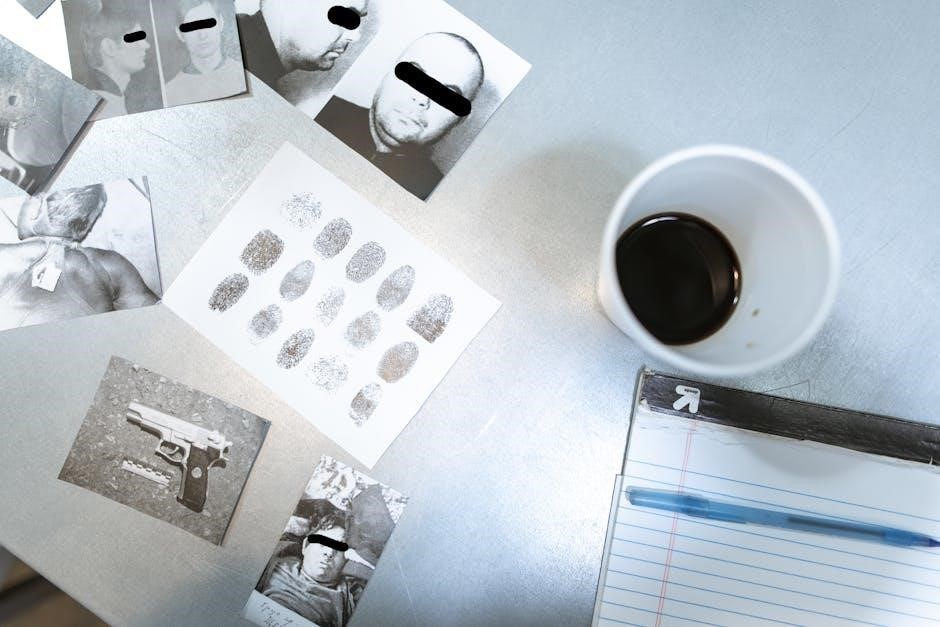Trevor Noah’s Born a Crime is a captivating memoir about his childhood in apartheid South Africa, blending humor with poignant reflections on identity and resilience.
1.1 Overview of the Book
Born a Crime is a memoir by Trevor Noah that recounts his unconventional childhood in apartheid South Africa; The book explores themes of identity, race, and resilience, blending humor with poignant storytelling. Noah shares his experiences growing up as a mixed-race child in a society where his existence was legally condemned. His mother, a black Xhosa woman, and his white Swiss father defied the law by having him, making Trevor living proof of their indiscretion. The memoir captures the absurdities of apartheid, the challenges of navigating racial divides, and the extraordinary measures his mother took to protect him. Through vivid anecdotes, Noah reflects on his journey of self-discovery, highlighting the universal themes of belonging and survival. The book is both a personal and historical account, offering a unique perspective on South Africa’s turbulent past;
1.2 Trevor Noah’s Background
Trevor Noah was born in 1984 in Johannesburg, South Africa, during the apartheid era. His mother, a black Xhosa woman, and his white Swiss father defied the law, as interracial relationships were illegal at the time. This made Trevor’s existence technically a crime. Growing up, he faced unique challenges due to his mixed-race identity, often feeling like an outsider in a society rigidly divided by race. Noah attended Catholic school before transitioning to government schools, where he navigated complex racial dynamics. After high school, he pursued a career in comedy, eventually becoming the host of The Daily Show, a platform that allowed him to share his insights on race, culture, and politics with a global audience. His upbringing shaped his perspective and humor, which he vividly recounts in Born a Crime.

Themes and Messages in “Born a Crime”
Trevor Noah’s memoir explores themes of identity, belonging, and societal injustice, using humor to navigate the complexities of growing up mixed-race in apartheid South Africa, offering universal insights.
2.1 The Struggle of Being Mixed-Race in Apartheid South Africa
Trevor Noah’s existence as a mixed-race child in apartheid South Africa was legally deemed a crime, born to a white Swiss father and a black Xhosa mother during a time when such unions were punishable by law. This illegal status forced his mother to take extreme measures to protect him, often keeping him hidden indoors to avoid detection by authorities. The societal norms of apartheid created a world where Trevor struggled to find his place, constantly navigating the complexities of racial segregation and the absurdities of a system that criminalized his very being. His experiences highlight the deep racial divides and the resilience required to survive in such a hostile environment, offering a powerful critique of the apartheid regime’s inhumanity.

2.2 The Role of Identity and Belonging
Trevor Noah’s memoir delves deeply into the complexities of identity and belonging, shaped by his experiences as a mixed-race child in apartheid South Africa. Born to a white father and a black mother, Trevor existed in a legal and social limbo, where his very presence challenged the rigid racial categories enforced by the apartheid regime. His journey through childhood and adolescence is marked by constant navigation of these divides, as he struggles to find acceptance in a world that refuses to acknowledge his existence. Noah’s story highlights the tension between societal definitions of identity and the self-perception shaped by family, culture, and personal resilience. His mother’s unwavering support plays a pivotal role in helping him embrace his unique identity, despite the external forces seeking to erase it.
2.3 Humor as a Coping Mechanism
In Born a Crime, Trevor Noah uses humor as a powerful tool to navigate the harsh realities of his childhood in apartheid South Africa. His ability to find comedy in even the most dire situations serves as both a shield and a bridge, allowing him to connect with others while protecting himself from the pain of discrimination and poverty. From the absurdity of racial classifications to the quirks of his mother’s religious devotion, Noah’s anecdotes reveal how humor became a survival tactic. This approach not only highlights his resilience but also underscores the universal appeal of comedy in transcending cultural and social barriers, making his story relatable and deeply human.

Key Chapters and Their Significance
Chapters like “Born a Crime” and “Chameleon” vividly illustrate Trevor Noah’s experiences, highlighting themes of identity, survival, and resilience in apartheid South Africa.
3.1 Chapter 2: “Born a Crime”
Chapter 2, titled “Born a Crime”, is a pivotal section of Trevor Noah’s memoir, detailing his birth during apartheid South Africa. This chapter highlights the illegal nature of his existence as the son of a white Swiss father and a black Xhosa mother, a union punishable by law. Noah recounts how his mother went to extraordinary lengths to hide him, fearing government discovery. The chapter underscores the absurdity and brutality of apartheid laws, while also showcasing his mother’s determination and resourcefulness. Through vivid storytelling, Noah illustrates the emotional toll of living in secrecy and the profound bond between him and his mother; This chapter sets the stage for themes of identity, resilience, and the struggle for belonging in a deeply divided society.
3.2 Chapter 4: “Chameleon”
Chapter 4, titled “Chameleon”, explores Trevor Noah’s experiences navigating the complexities of racial identity in post-apartheid South Africa. The chapter highlights his ability to adapt and blend into different racial groups, a skill he developed to survive in a divided society. Noah recounts how he learned to switch between languages and behaviors to fit in with various communities, from black townships to white suburbs. This chameleon-like adaptability, while practical, also left him feeling disconnected from a single identity. The chapter delves into themes of belonging and the challenges of finding one’s place in a world defined by rigid racial categories. Noah’s humor and insight shine as he reflects on the absurdity of these societal expectations and the emotional toll of constantly shifting identities. This chapter is a poignant exploration of identity, resilience, and the search for self in a fractured world.

The Cultural and Historical Context
Born a Crime is set against the backdrop of apartheid South Africa, where rigid racial laws governed society. Trevor Noah’s existence as a mixed-race child was illegal, reflecting the era’s deep-seated racial divisions and societal norms.
4.1 Apartheid and Its Impact on Society
Apartheid, a system of institutionalized racial segregation, dominated South Africa from 1948 to 1994. It enforced strict racial categorization, prohibiting mixed-race relationships and creating a deeply divided society. Under apartheid, non-white South Africans faced severe discrimination, limited rights, and violent enforcement of segregation. Trevor Noah’s birth to a white father and black mother was illegal, making him “born a crime.” This reflects the era’s rigid laws and societal norms. Apartheid’s impact extended beyond legal frameworks, fostering economic inequality, violence, and cultural repression. The system shaped Trevor’s early life, as his mother took extreme measures to protect him from authorities. Apartheid’s legacy continues to influence South Africa’s social and racial dynamics, as highlighted in Noah’s memoir.

Personal Stories and Lessons
Born a Crime shares Trevor Noah’s personal journey, highlighting his mother’s resilience and the challenges of growing up mixed-race in apartheid South Africa, offering lessons on identity and perseverance.

5.1 Trevor’s Relationship with His Mother
Trevor Noah’s relationship with his mother is a central theme in Born a Crime. His mother, a fiercely independent and religious woman, played a pivotal role in shaping his life. Despite the illegal nature of Trevor’s existence under apartheid, she took extreme measures to protect him, often hiding him indoors to avoid detection. Her determination to save him from poverty and violence is a testament to her unwavering love and resilience. Trevor credits her with teaching him the importance of humor, adaptability, and survival in a harsh world. Their bond is marked by both affection and struggle, as she instilled in him the strength to navigate a society that sought to marginalize him. This relationship is a heartbeat of the memoir, showcasing the profound impact she had on his journey.
